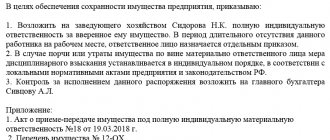Responsibility for minors
On the responsibility of minors
A minor, like any citizen, has rights and responsibilities and is legally responsible for his actions to the state and other people.
This responsibility depends on the age and severity of the act committed. In order to prevent the commission of offenses and be able to defend against unfair accusations, you need to know the basic provisions of the legislation on the responsibility of minors.
The main duty of anyone, including minor citizens, is to comply with the laws and not commit offenses, as well as not to violate the rights and legitimate interests of others.
For failure to fulfill this obligation, a citizen, including a minor, may be subject to four types of legal liability:
- criminal;
- administrative;
- legal;
- disciplinary.
In addition, a minor may be sent to a specialized educational institution, which is not formally considered a punishment, but is also punishable for committing an offense.
Criminal liability of minors
Criminal liability is the strictest type of liability. It occurs for committing crimes, that is, the most dangerous offenses.
Criminal liability begins as a general rule at the age of 16, but for many acts that are crimes, at the age of 14. For example, from the age of 14, criminal liability begins for murder, intentional infliction of grievous or moderate harm to health (including, for example, in a fight), rape, theft, robbery, extortion, knowingly false reporting of an act of terrorism, vehicle theft, hooliganism under aggravating circumstances, theft or extortion of narcotic drugs and others. It must be borne in mind that committing a crime as part of a group (that is, by several people) is an aggravating circumstance and entails a more severe punishment.
Criminal penalties for minors are: fine (if the minor has independent income or own property), deprivation of the right to engage in certain activities (for example, entrepreneurship), compulsory work (work performed in free time from study, without pay), correctional labor ( work at a place designated by the city or district administration, with deduction from earnings), arrest and imprisonment for a certain period (up to ten years).
If a minor has committed a crime of minor or moderate gravity, his punishment may be replaced by compulsory educational measures (consisting, for example, of placing him under the supervision of a specialized body, the obligation to compensate for the harm caused, a ban on visiting certain places, limiting his stay outside the home, etc.) . In addition, at the discretion of the court, a minor may be sent to a specialized educational institution for a period until the age of majority, but not more than 3 years.
Procedure for criminal prosecution:
If the police or prosecutor's office receive information about the commission of a crime, these facts are first checked, then, if the facts are confirmed, a criminal case is initiated and an investigation begins. At the end of the investigation, the case is transferred to the court, which considers the case and makes a verdict.
At the verification stage, if a minor is involved in a crime, he may be interviewed. If a criminal case has already been initiated and an investigation has begun, then they may be summoned for interrogation, which must be carried out according to certain rules: if a minor is a victim or witness, then he can be present during the interrogation, and if he is under 14 years old, a teacher must be present, and, if desired, he can also one of the parents. In this situation, if the teenager is under 16 years old, you can be summoned for questioning through your parents or guardians, or through the administration at the place of study or work.
If a teenager is 16 years old or older, then he may be subject to criminal prosecution for knowingly giving false testimony or refusing to testify, which is warned about at the beginning of the interrogation.
If a minor is suspected or accused of committing a crime, a defense attorney must participate in the interrogation. If the minor has not reached the age of 16, then it is mandatory that a teacher or psychologist also participate in the interrogation. Parents can also participate in interrogation and other investigative actions on the basis of a decision on their admission. A minor can be summoned for questioning only through legal representatives (parents, guardians); The only exception is the case when the minor is in a special educational institution. The participation of a defense attorney must be ensured, and the participation of parents must be ensured at their request also during other investigative actions (search, confrontation, etc.).
If a minor is suspected of committing a crime for which a sentence of imprisonment may be imposed, he may be detained provided that he was caught at the scene of the crime or immediately after it was committed, or victims or eyewitnesses of the crime indicate him, or he has evidence obvious traces of a crime were found, as well as in some other cases, for example, if his identity has not been established. Parents or guardians must be notified immediately of the arrest. From the moment of detention, a minor has the right to demand the provision of a defender (lawyer). The teenager must be immediately explained on what basis and on what suspicion he is being detained. Within 3 hours, a detention report must be drawn up, which must be carefully read and signed, if everything in it is correct. A minor can be detained for a period of no more than 48 hours (this period can be extended to 72 hours), after which they must be released, or, based on a judge’s order, taken into custody, which is allowed only on suspicion of committing a serious or especially serious crime.
After arrest, the minor must be questioned. Before the start of the interrogation, at his request, a private meeting with the defense attorney must be provided. The interrogation procedure here is the same as described above.
It should also be borne in mind that during an arrest, and in all other cases, police officers have the right to use physical force, including combat techniques, but only to suppress crimes and administrative offenses, detain the persons who committed them, and overcome opposition to legal requirements, and only if non-violent methods do not work. At the same time, when using physical force, special means or firearms, a police officer is obliged to: warn of the intention to use them, while providing sufficient time to comply with the requirements of the police officer, strive to ensure that the damage caused is minimal; ensure that persons who have received bodily injuries are provided with pre-medical care and that their relatives are notified as soon as possible. The detainee himself is obliged to obey the lawful demands of the police.
Administrative responsibility of minors
This type of liability is more lenient than criminal liability and occurs for less dangerous offenses.
Administrative responsibility begins at the age of 16. Examples of administrative offenses are: promotion of narcotic drugs, prostitution, petty hooliganism, violation of traffic rules (including ticketless travel), failure to comply with the requirements of a bailiff, appearing intoxicated in public places, etc. However, if you drink alcohol drinks (including beer) or appears in a state of intoxication in a public place, and you are under 16 years old, your parents will bear administrative responsibility. It does not matter how the state of intoxication was achieved: drinking wine, beer, or medications and other substances. Persons who offer you alcoholic beverages or other intoxicating substances are also subject to administrative liability.
The parents of a minor will also be held responsible if they raise you improperly (including, this is possible if the minor commits any antisocial acts, and the guilt of the parents in his improper upbringing will be established).
Administrative penalties, mainly applied to minors, are: fine, paid confiscation of the instrument of the offense (for example, a gun), confiscation of such a weapon (i.e., gratuitous confiscation), deprivation of a special right (for example, the right to hunt or drive a car).
The procedure for bringing to administrative responsibility:
Cases of administrative offenses committed by minors, as well as in relation to them, are considered by commissions on the affairs of minors and the protection of their rights. But, for example, the police can also draw up a report on an offense. You may be detained for committing an administrative offense. The period of detention cannot exceed three hours. Your parents must be notified immediately. If minors are detained, they must be kept separately from adults. After three hours you must be released, but if you arrived in a state of intoxication, three hours are counted from the moment you sobered up.
In the event of an administrative offense, an administrative investigation is carried out, which may include an interview, seizure of material evidence, documents, etc. Then the case is considered by the commission on affairs of minors and the protection of their rights and a decision is made to impose an administrative penalty.
Protection of rights during the investigation and consideration of the case is carried out by parents or guardians. They and the minor can read all the materials of the case, give explanations, present evidence, benefit from legal assistance from a defense attorney and other rights.
Administrative and criminal liability for the same offense cannot be imposed together!
Civil liability of minors
It occurs for causing property damage to someone or causing harm to health, honor and dignity, etc.
Civil liability is property (usually monetary) compensation for harm to the injured person.
Even if a minor caused harm to someone’s health or insulted someone’s honor and dignity, compensation for the harm will need to be made in the form of a certain amount of money.
If a teenager is under 14 years old, his parents or guardians will bear civil liability for the harm you cause.
If a teenager is between 14 and 18 years old, he must compensate for the damage with his property or earnings, and if he does not have it or does not have enough, his parents will compensate.
The procedure for bringing to civil liability:
A person is brought to civil liability by a court decision. This means that if a minor and his parents do not want to voluntarily compensate the victim for damages, he can file a lawsuit against the teenager and/or his parents. As long as the teenager is under 18 years old, his parents (guardians) must represent his interests in civil court, but if he is already 14 years old, the court must also involve the minor in the case if his rights and interests are affected. Civil proceedings do not provide for preventive measures, detention or other coercive measures. Evidence in the case is collected and presented by the plaintiff and defendant themselves.
Criminal and civil liability for the same offense can occur together (for example, imprisonment and compensation for harm (monetary compensation) to the victim). Administrative and civil liability may also occur together.
Disciplinary responsibility of minors
It can only be applied if the minor is working under an employment contract. It occurs for violation of labor discipline (being late, failure to fulfill one’s duties, etc.). There are only three forms of disciplinary liability: reprimand, reprimand, dismissal. There cannot be disciplinary liability in the form of deductions from wages or in other forms. However, if damage is caused to the employer's property, financial liability may arise in the form of compensation for damage.
The procedure for bringing to disciplinary liability:
These three penalties are imposed by orders of the employer. It can be appealed to the labor inspectorate or trade union.
Other measures applied to minors
If a minor aged 11 years or older has committed a criminal offense, but has not yet reached the age of criminal responsibility, or has committed a crime of average gravity, but has been released from punishment by the court, he may be placed in a special closed educational institution. This is done on the basis of a judge's order or a court verdict. The maximum period for which a minor can be sent there is 3 years. This measure is legally considered not a punishment, but a special form of education for minors.
Minors who have committed socially dangerous acts may be temporarily sent to temporary detention centers for juvenile offenders. As a general rule, they are kept there for no more than 30 days.
Minors held in special educational institutions may be subject to penalties such as a warning, reprimand, or severe reprimand.
Another measure applied to minors is exclusion from an educational institution (school, college, etc.). It can be applied for gross and repeated violations of the institution’s charter or the commission of illegal actions by decision of the institution’s administration. However, this measure can only apply to children over 14 years of age.
Date posted: July 29, 2021, 3:44 pm
The concept of criminal liability of minors
annotation
.
This article covers issues related to the criminal liability of minors. The features of this legal institution are considered, because the criteria of responsibility for minors are completely different than for adults who have committed a crime. A detailed analysis of the types of punishments that can be imposed on minors under Russian criminal law is also provided. Key words
: criminal liability, minors, types of punishment, features of punishment, public danger.
The issue of the responsibility of minors for crimes is very relevant at the present time. This is due not only to the legal status of children in our state, but also to a significant increase in crime among teenagers: if we take the statistics of the Ministry of Internal Affairs in recent years, then for the period from January to July 2021, every twenty-seventh crime, which is approximately 4% of the total number of crimes committed by minors or with their participation. The total number of identified minors was 22,787.
All this necessitated the inclusion of provisions on the criminal liability of minors in a separate chapter of the Criminal Code of the Russian Federation. In order to further consider questions about the liability of minors under the Criminal Code of the Russian Federation, it would be advisable to first define the concept of a minor. According to Art. 87 of the Criminal Code of the Russian Federation, minors are recognized as individuals who were 14 years old at the time of committing a crime, but who have not yet reached 18 years of age [1]. As for the issue of criminal liability of the above-mentioned persons, it is regulated by the general provisions of the Criminal Code of the Russian Federation. At the same time, the peculiarities of mental development of the individual must be taken into account: adolescents often have an unstable psyche, they are not able to correctly evaluate their actions due to personal immaturity. It is important to note that the current legislation necessarily takes into account many circumstances when determining the limits of the age of criminal responsibility of minors, but the peculiarities of the development of their intellect and will also play an important role. So, according to Art. 20 of the Criminal Code of the Russian Federation, most crimes are characterized by the onset of criminal liability from the age of 16, and only for some crimes - from the age of 18. The latter is explained by the fact that the subject of these crimes (for example, crimes against military service, various official crimes) can only be an adult. There is also a minimum age of criminal responsibility of 14 years.
As for the types of punishments that are applied in the current legislation for minors, they are regulated by Art. 88 of the Criminal Code of the Russian Federation. Types of punishment for minors are: fine; deprivation of the right to engage in certain activities; compulsory work; correctional work; restriction of freedom; imprisonment for a certain period. Thus, we see that out of 13 types of punishments provided for by the Criminal Code of the Russian Federation for all types of convicts, only 6 can be applied to minors, which are more appropriate to the age of such persons, their status in society and the purposes of punishment [3].
To make it more convenient to consider the types of punishments applied to minors, we can conditionally divide them into 2 groups: punishments that do not involve restriction of freedom and punishments associated with restriction of freedom. The first group of punishments consists of sanctions such as: fine; deprivation of the right to engage in certain activities; compulsory work; correctional work. The peculiarities of penalties for minors are that the amount of the fine varies from 1 to 50 thousand rubles, or in the amount of wages or other income of the minor for a period from 2 weeks to six months. A fine can also be imposed if the minor does not have any income or property that would be subject to collection. In this case, the fine is collected from the parents or legal representatives of the minor, according to the court decision. However, when imposing a fine and determining its amount, the courts must take into account the financial situation of the minor so that he is not deprived of the necessary material benefits that are important for life.
In case of malicious evasion of a fine by a convicted person, this type of punishment may be replaced with compulsory or corrective labor, based on the amount of the fine imposed. But in fact, in practice, a fine is imposed on minors extremely rarely. As for the deprivation of the right to engage in certain activities, the law for some reason does not establish the terms and procedure for its appointment in relation to a minor. In this case, when appointing him, the court should be guided by Art. 47 of the Criminal Code of the Russian Federation. Responsibilities for the execution of this type of punishment are borne by the criminal-executive inspection at the place of residence of the convicted minor. As the main type of punishment, it can be imposed for a period of 1 to 5 years, and as an additional punishment - from 6 months to 3 years.
The main types of punishment also imposed on minors include compulsory labor. The duration of such punishment is limited: the minimum limit is 40 hours, the maximum is 160 hours. Execution of this type of punishment is carried out in free time from main work or study. If there are good reasons, then the penitentiary inspection may reduce the number of hours during the week. This feature of this type of punishment is that its execution is carried out at the place of residence of the convicted person. If such work endangers the life or health of a minor, then its use is prohibited by law. However, the use of compulsory labor is not currently carried out, since there are no necessary conditions for the execution of this type of punishment [5]. As for correctional labor, it can be assigned to minors for a period of up to 1 year (maximum period). This type of punishment is also the main one. The minimum period for which correctional labor can be assigned is specified in Art. 50 of the Criminal Code of the Russian Federation, and is 2 months.
Taking into account the above, we can say that punishments imposed on minors that do not involve restriction of freedom are more lenient than similar types of punishments for adults. Considering the second group of punishments, i.e. related to restriction of freedom, we note that these include: restriction of freedom directly, as well as imprisonment for a certain period.
In case of malicious evasion of a convicted person from serving this sentence, the court may replace the unserved part of it with imprisonment as follows: 1 day of imprisonment for 2 days of restriction of freedom. Imprisonment is the most severe form of punishment for persons under 18 years of age. The peculiarities of this type of punishment are that it is imposed on persons under the age of 16, but for a period not exceeding 6 years. In the case of committing a particularly serious crime, the maximum term of such punishment for a minor is extended to 10 years [4].
As for a suspended sentence, it is not applied as a punishment, but acts as an exemption from it in cases where the crime committed is of minor gravity and is committed for the first time.
To summarize, I would like to note that minors are a special category of persons, with their unformed worldview and not fully conscious system of values, and therefore they should receive increased attention and care from their elders, as well as from the state. The existing norms of the Criminal Code of the Russian Federation fully take into account the civil, physical and spiritual immaturity of minors: therefore, the types of criminal liability are more humane for them. It is also important to take into account the educational aspect: when imposing a punishment on a minor, the court must fully take into account the purpose of the punishment - the re-education of the convicted person. After all, sometimes, by tightening responsibility, it is not always possible to achieve the desired result, but only aggravate the situation, harming the unformed psyche of a minor where it was simply necessary to help him get on the right path. The punishment must comply with the principle of individualization: take into account the age of the minor, as well as mitigating and aggravating circumstances.
Bibliography
1. Criminal Code of the Russian Federation. Adopted on June 13, 1996 – M.: Legal literature, 1996. 2. Criminal Executive Code of the Russian Federation. Adopted on January 8, 1997 – M.: Legal literature, 1997. 3. Borovikov, V. B. Criminal law. A common part. Textbook / V.B. Borovikov, A.A. Smerdov. - M.: Yurayt, 2015. - 212 p. 4. Zilbershtein, A. A. Criminal executive law. Lecture notes / A.A. Silberstein. - M.: Prospekt, 2013. - 200 p. 5. Malinin, V.B. Criminal executive law / V.B. Malinin, L.B. Smirnov. - M.: Professor Malinin's publication, 2009. - 360 p.






